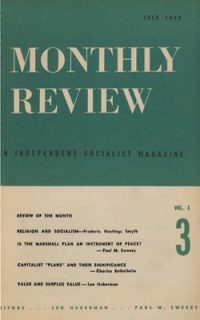Donate
Throughout its history, Monthly Review has relied on the support of our readers. We have no deep pockets, no roster of big donors, no foundation support. We exist because our readers value and support our work. Please consider making a donation today. Use the form below to make a donation via Paypal, or send a check to Monthly Review, 134 W 29th, STE 706, New York, NY 10001. The Monthly Review Foundation is a 501(c)(3) nonprofit organization; all donations are tax deductible.
You may also wish to consider becoming an MR Associate. Please visit the MR Subscriptions page for details.
At the “View Cart” step, you can enter your contact information to receive proof of your donation.
From time to time we receive bequests from readers who want to contribute to the continuance of Monthly Review, Monthly Review Press, or the Monthly Review Foundation. Those who wish to do the same may simply state in their wills that the bequest is to the Monthly Review Foundation, 134 W 29th, STE 706, New York, NY 10001. For additional information, contact Martin Paddio at 212-691-2555, or use our contact page.
Related products
-
![Monthly Review Volume 2, Number 1 (May 1950) [PDF]](https://monthlyreview.org/wp-content/uploads/2015/09/Monthly Review Volume 2, Number 1 (May 1950) [PDF].jpg)
Monthly Review Volume 2, Number 1 (May 1950) [PDF]
$10.00 Add to cart -
![Monthly Review Volume 1, Number 12 (April 1950) [PDF]](https://monthlyreview.org/wp-content/uploads/2015/09/Monthly Review Volume 1, Number 12 (April 1950) [PDF].jpg)
Monthly Review Volume 1, Number 12 (April 1950) [PDF]
$10.00 Add to cart -
Monthly Review Volume 1, Number 10 (February 1950) [PDF]
$10.00 Add to cart -
Monthly Review Volume 1, Number 6 (October 1949) [PDF]
$10.00 Add to cart -
![Monthly Review Volume 1, Number 4 (August 1949) [PDF]](https://monthlyreview.org/wp-content/uploads/2015/09/Monthly Review Volume 1, Number 4 (August 1949) [PDF].jpg)
Monthly Review Volume 1, Number 4 (August 1949) [PDF]
$10.00 Add to cart -

Monthly Review Volume 1, Number 3 (July 1949) [PDF]
$10.00 Add to cart

![Monthly Review Volume 1, Number 10 (February 1950) [PDF]](https://monthlyreview.org/wp-content/uploads/2015/09/Monthly Review Volume 1, Number 10 (February 1950) [PDF].jpg)
![Monthly Review Volume 1, Number 6 (October 1949) [PDF]](https://monthlyreview.org/wp-content/uploads/2015/09/Monthly Review Volume 1, Number 6 (October 1949) [PDF].jpg)